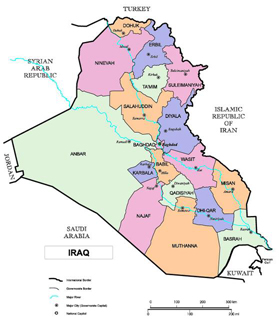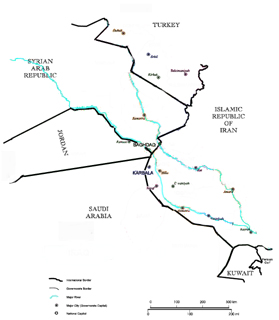Update, 10:46 PM… I am reminded by Steve Benen of many things, perhaps most significant is that the reality of the Turk-Kurd dynamic is just too much to blithely gloss over. I try to slide over it below (while acknowledging it) to make this whole piece more thematically tight, but that’s just ridiculous. Any new borders would have to include a Kurdish state. And any Kurdish state would incur the wrath of the Turks – but that’s still a scenario more managable than a Turkey-absorbed Kurdistan, so try this map instead. Eh, I’ll stick with state, local and national politics…
(Please note: I am not promoting this as the solution, merely…making conversation… those who read this site know that I am not a foreign policy guy.)
The trisection of Iraq into three states – one each dominated by Kurds, Shia and Sunnis – is a notion that never quite goes away, but is never quite seriously addressed either. Even it's high-profile proponents such as Senator Joe Biden hardly seem to mention it anymore. Iraq, which was carved into a state arbitrarily in the post-colonial era, never truly gained the sort of national identity that the secular baathists were trying to create, and it can certainly be argued that now is a less than ideal time to somehow make it work – especially since it's now being suggested that hardwiring these underlying divisions into the nascent, dysfunctional parliament may have only served to exacerbate the friction.
But it always does raise one question for me. If the geographic carving knife is on the rhetorical table, instead of making one problematic state building project into three, is it worth considering going the other direction? For example:
Problem: |
Solution? |
Again, I'm not proposing it, but it's an interesting point of conversation (including some very big associated problems)…
The big advantages are obvious; it becomes a Middle East management problem, rather than an American one. We’ve also traded in a crumbling, unstable non-state in the heart of the most volatile region in the world for more-or-less the old status quo, as far as stability goes – Iran, Saudi Arabia, Turkey, Jordan and Syria are stable and aren’t going anywhere anytime soon.
The biggest problem is also the most tantalizing one – that Iran and Syria would have to be full partners. In fact, Iran in particular would be given a great big bonus in the form of much of the Iraqi oilfields they’ve coveted for so long, in the process of absorbing the mostly shia south (including critical Shia holy sites). This would not only make Israel uncomfortable, but neighboring Saudi Arabia as well, which has been leery of the influence of non-Arab Iran in the Middle East. Syria also would see a boost in stature. In fact, states like Jordan and Syria might want no part of such an arrangement, inheriting as they would the least commercially viable portions of old Iraq, but the argument could be made that they are receiving the lion’s shares of refugees already, so the infrastructure burden is largely foisted on them regardless, and the pot could be sweeteened with additional foreign aid.
But it’s tantalizing because it forces friend and foe to the table in the interest of making a stable situation for all. The battleground becomes the common ground.
Then there’s the other big problem – the north. It would be highly problematic for Turkey to functionally govern across its southern mountains, and the Kurds would be none too happy – explosively so. Turkey has repressed its own Kurdish population for some time, and native Turkish Kurds have responded violently. Indeed, this is the flip side of the biggest problem with the “three states” scenario promoted by Biden, as the Turkish military would not abide an independent Kurdish state on their borders that they would see as a safe haven and a base of operations for Kurdish resistance fighters in Turkey.
But there may be a window of opportunity for a change in the dynamic. The secular candidate for Turkey’s top political spot just lost while running on a platform meant to rally popular support around the idea of the Kurds as a threat. That political failure could open new discussions with Kurds and – again with promises of foreign aid – there may be an opportunity to discuss such a Kurdish province in the context of new human rights understandings.
Yeah, yeah I know – all this: not bloody likely.
But since the whole place is going to hell in a handbasket since we stepped in and busted it up – and there doesn’t seem to be anything to be done about it – might as well throw every option on the table, eh?


